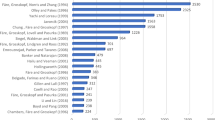
Overview
- Develops the theory of productivity measurement without relying on neo-classical assumptions
- Emphasizes the fundamental equivalence of multiplicative and additive models
- Rooted in National Accounts, with much attention for measurement issues
- Contains a comprehensive discussion of top-down and bottom-up aggregation
- Discusses the decomposition of productivity indices into components
- Focuses on practical application of theory
Part of the book series: Contributions to Economics (CE)
Access this book
Tax calculation will be finalised at checkout
Other ways to access
About this book
This book develops the theory of productivity measurement using the empirical index number approach. The theory uses multiplicative indices and additive indicators as measurement tools, instead of relying on the usual neo-classical assumptions, such as the existence of a production function characterized by constant returns to scale, optimizing behavior of the economic agents, and perfect foresight. The theory can be applied to all the common levels of aggregation (micro, meso, and macro), and half of the book is devoted to accounting for the links existing between the various levels. Basic insights from National Accounts are thereby used. The final chapter is devoted to the decomposition of productivity change into the contributions of efficiency change, technological change, scale effects, and input or output mix effects. Applications on real-life data demonstrate the empirical feasibility of the theory.
The book is directed to a variety of overlapping audiences: statisticians involved in measuring productivity change; economists interested in growth accounting; researchers relating macro-economic productivity change to its industrial sources; enterprise micro-data researchers; and business analysts interested in performance measurement.
Similar content being viewed by others
Keywords
Table of contents (10 chapters)
-
Front Matter
-
Back Matter
Reviews
Authors and Affiliations
About the author
Prof. Dr. Bert M. Balk (1947) held a chair in business administration, in particular the measurement of price, quantity, and productivity changes and economic-statistical research, at Rotterdam School of Management, from 2001 to 2011. This chair was supported by Statistics Netherlands, where Prof. Balk worked in various positions from 1973 to 2011. He was deputy head of the Department for Price Statistics, and pioneering director of the Center for Research of Enterprise Microdata. His research interests include measurement in economics, in particular index number theory and productivity measurement. He has published a large number of articles in academic journals, has written two books, and has served on the editorial boards of the Journal of Productivity Analysis, Statistica Neerlandica, and The Review of Income and Wealth. He is a fellow of the Society for Economic Measurement.
Bibliographic Information
Book Title: Productivity
Book Subtitle: Concepts, Measurement, Aggregation, and Decomposition
Authors: Bert M. Balk
Series Title: Contributions to Economics
DOI: https://doi.org/10.1007/978-3-030-75448-8
Publisher: Springer Cham
eBook Packages: Economics and Finance, Economics and Finance (R0)
Copyright Information: The Editor(s) (if applicable) and The Author(s), under exclusive license to Springer Nature Switzerland AG 2021
Hardcover ISBN: 978-3-030-75447-1Published: 23 July 2021
Softcover ISBN: 978-3-030-75450-1Published: 24 July 2022
eBook ISBN: 978-3-030-75448-8Published: 22 July 2021
Series ISSN: 1431-1933
Series E-ISSN: 2197-7178
Edition Number: 1
Number of Pages: XVII, 328
Number of Illustrations: 4 b/w illustrations
Topics: Econometrics, Industrial Organization, Economic Growth, Applied Statistics



